An occasional issue with air conditioners is that they may switch on, work for a few seconds, and then shut off. If you have faced this problem, you have come to the right place. There are several reasons why this might be happening, and we will help you in determining the cause as well as resolving this issue. So why does an air conditioner start and then stop after a few seconds?
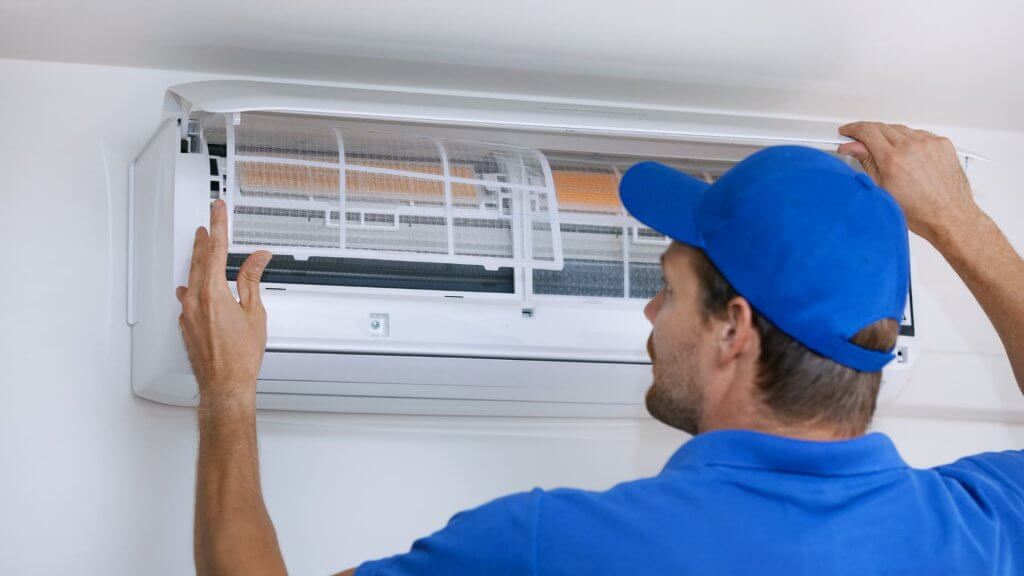
1. Problems with Thermostat
A thermostat senses the temperature of your room and signals the air conditioner to switch on when it becomes too hot or too cold. Your air conditioner cannot work without a thermostat.
Let’s discuss the basic workings of the thermostat:
Suppose you want your room temperature to be 68℉. The thermostat will start the air conditioner when it senses that the temperature of your room is above 68℉.
The air conditioner will help remove the heat from your room. The thermostat will turn off your air conditioner again when it senses that the temperature has gone below 68℉.
If there is a fault in your thermostat that makes it think that your room temperature is always below 68℉, your AC will start and then stop after a few seconds.
Solutions
- Sometimes dust accumulates on your AC’s mechanical and electrical components, affecting the operation of the thermostat. You can clean it with a soft brush and then try turning on your air conditioner.
- Check the battery of your thermostat. If the battery is low, it can affect the operation of the thermostat. Replace with new batteries, and then check your air conditioner.
- If the problem still persists, consider calling an HVAC (Heating Ventilation And Airconditioning) professional to diagnose your thermostat.
Related article: Air Conditioners Buyer Guide
2. Clogged Air Filter
The air in your room can contain a lot of dust, dirt, and other particles, and these particles can damage your air conditioner, as the air in your room enters through the air filter of your air conditioner.
The air filter traps the dust and other impurities, and then clean air moves to the cooling coil, blower, and finally to the room. But when this air filter is clogged, it can cause numerous problems. This may cause your air conditioner to start and then stop after a few seconds.
Even if your AC is working fine, a clogged air filter will make it work, increasing your electricity bills. Moreover, the air inside your room will have more contaminants that are not good for your health.
Solution
- Clean the air filter of your air conditioner thoroughly or else replace the air filter as soon as possible.
Related article: Can You Wash a HEPA Filter?
3. Condenser Coils Are Dirty
Your air conditioner works as a vapor compression system. There are four main components of this system: the evaporator, the compressor, the condenser, and the expansion valve.
The air-cooled condenser used in your air conditioner is a heat exchanger. The refrigerant enters the condenser at high pressure and temperature. It exchanges heat with the outside air, changes its phase from gas to liquid, and then enters into the other components of the vapor compression system.
The condenser is present inside your outdoor air conditioner unit so that it can exchange heat with the surrounding air. The coils can be caked in dust and dirt after a few years. This decreases the air conditioner’s efficiency, leading to the malfunction of your air conditioner.
Solution
- Clean the condenser coils from time to time. Call an HVAC professional to inspect the issue if this doesn’t work.
4. You Have Used an Oversized Air Conditioner
The air conditioner’s capacity is usually expressed in tons. The tonnage of the air conditioner means how much heat it can remove within one hour. A one-ton AC can typically remove 12,000 BTUs of heat in one hour from a room that is 400-500 sq. ft. in size. However, this also depends on other factors.
You should pick the right tonnage of the air conditioner according to the size of your room, sun exposure, climatic conditions, and the expected number of people who will occupy the room regularly.
Check out this chart of BTU’s and square feet to help you select the right BTU’s for your room size.
If you buy an air conditioner that has more than the required capacity, you will need to spend more money buying it. It will also give you bigger energy bills, and the system might not work at peak efficiency.
Similarly, if you purchase an air conditioner with less than the required capacity, the air conditioner will likely not cool the room well enough.
In this case, you may face the same problem. Your air conditioner is switching on and off because you have used an ill-sized air conditioner in your room.
Solution
- Check out our chart to calculate the approximate tonnage you need based on your room size, climatic conditions, and other factors. Selecting the right ton of air conditioner is key to avoiding many air-conditioning problems and simultaneously reducing your energy bills.
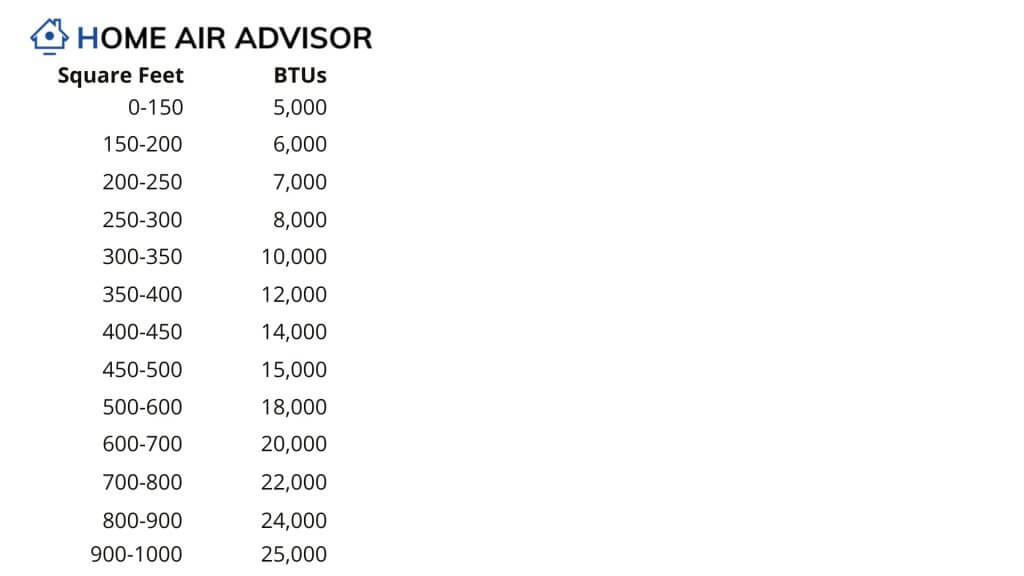
5. Issues With Refrigerant
The refrigerant is a heat-carrying medium in your air conditioner. It undergoes a repeated phase transition, i.e. from gas to liquid and then liquid to gas, continuously inside the air conditioner.
There are various refrigerants available on the market. In earlier days, CFCs (chlorofluorocarbon) were used in air conditioners. But the chlorine atoms released into the atmosphere were slowly depleting the ozone layer and allowing harmful ultraviolet rays to pass down through the atmosphere, contributing to global warming and acting as a carcinogen. So, these were banned and replaced by hydrofluorocarbons like R-134a.
An air conditioner cannot work without a refrigerant. The compressor will not correctly function when this refrigerant leaks or becomes too low. It can create a short cycle and cause severe wear and tear to your air conditioner.
Your air conditioner will start but stop after a few seconds. Moreover, a refrigerant leak is dangerous because these chemicals are harmful to humans.
Solution
- Do not try to fix this problem on your own; call an expert who can check and replace your refrigerant.
Related article: Air Conditioner Blows Too Cold
6. Compressor Failure
The compressor is the heart of your vapor compression cycle. The refrigerant enters the compressor at low pressure and temperature and is then compressed to high pressure and temperature.
But sometimes, your air conditioner’s compressor becomes overheated or does not function properly. If you notice that your air compressor is shutting off after using it for a few minutes, it may be overheated, or some of its parts might be damaged. Consequently, it will constantly turn your AC on and off.
Solutions
- Most AC producers offer a long warranty on the compressor, so it is best to check if yours is still under the warranty period.
- If not, the next best thing you can do is contact a local air conditioner repair company. The engineer will diagnose the problem and may replace the compressor if necessary.
7. Coils of Your Evaporator Have Frozen
The evaporator is inside the indoor unit of your air conditioner unit. Sometimes the coils of your evaporator become frozen. This can decrease the system’s efficiency. Your air conditioner will turn on and off due to frozen evaporator coils.
Solution
- You may have a refrigerant leak that is causing the coils to freeze. So call the HVAC company to fix the issue.
Related article: What To Do When Your AC Unit Freezes Up?
8. Electrical Problems
There may be problems with electric supply lines or capacitors, which can cause your air conditioner to turn on and off.
Solution
- Electrical problems may be complex for you to diagnose. Call a professional who can detect the issue.
9. Run Capacitor Is Not Functioning Properly
The run capacitor provides a sudden boost of energy to your air conditioner. Moreover, it provides a continuous power supply so that your air conditioner keeps on running.
But when your run capacitor goes bad, it may cause intermittent power supply, which can cause your air conditioner to turn on and off.
Solution
- You can contact your local air conditioner repair company. A technician can diagnose the problem and may replace the run capacitor.
Final Thoughts
As you can see, there can be many reasons why an AC might be turning on and off constantly. It is best to check if your AC unit still has a warranty. Next, you may take advice from an HVAC expert. However, it is also important to learn good AC maintenance practices such as regular cleaning and servicing.
Related articles:
- HVAC Maintenance Tips – Everything You Need To Know
- Can We Use AC When Water Is Leaking?
- Why Is My AC Unit Fan Not Spinning? Best Solution
- Why Is My Portable Air Conditioner Not Cooling?
- How Long Does An Air Conditioner Last And When To Replace
Thank you for reading this article, and we hope we have answered all your queries regarding fixing your air conditioner.

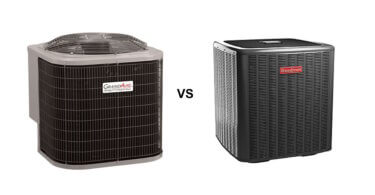
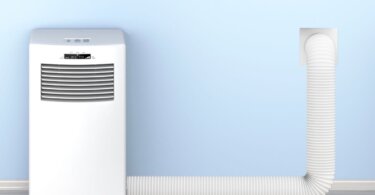
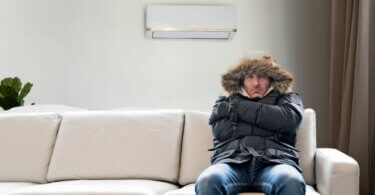

Leave a Comment